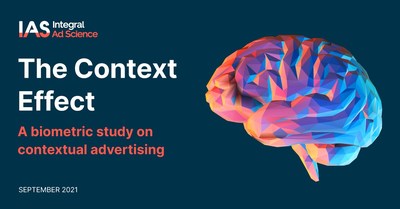IAS Study Shows Ad Context Increases Memorability Up to 40%
On Sept. 7, 2021, Integral Ad Science (NASDAQ: IAS) released a study titled The Context Effect, conducted with Neuro-Insight. The research reveals that contextual matching significantly enhances ad memorability, with findings showing a 23% lift in memory for endemically matched ads and a 40% increase for emotional ads paired with related content. 63% of consumers viewed ads as a natural part of their online experience. The study underlines the potential for advertisers to leverage contextual targeting to improve campaign outcomes as the industry moves towards cookieless marketing.
- Endemically matched ads resulted in a 23% increase in activation in memory areas of the brain.
- Informational ads paired with relevant articles achieved a 36% improvement in detail memory.
- Emotional ads showed a 40% increase in memorability when aligned with thematic content.
- 63% of consumers consider ads a part of their online experience rather than disruptive.
- None.
Insights
Analyzing...
NEW YORK, Sept. 7, 2021 /PRNewswire/ -- Integral Ad Science (Nasdaq: IAS), a global leader in digital media quality, today released The Context Effect, the company's latest biometric research on the importance of context in advertising. Conducted with IAS and Neuro-Insight, a neuromarketing and neuroanalytics company, this study goes beyond traditional survey data on consumer preferences and examines brain activity in response to contextually matched ads, showing context can significantly impact ad memorability.
"Using the latest neuroscience and neurometrics, this groundbreaking study demonstrates the specific ways that a webpage's context can dramatically alter how audiences recall and respond to ads,'' said Tony Marlow, CMO, IAS. "As our industry prepares for a cookieless future and increasingly moves away from audience targeting, advertisers have a significant opportunity to be intentional with contextual targeting tools, such as IAS Context Control, to drive greater campaign outcomes."
In The Context Effect, consumers evaluated content across three types of contextual matching and IAS uncovered these key findings that can help brands ensure their ads resonate:
- Endemically matched ads drive higher memorability: Endemically matched ads, or those that align with and match the surrounding content based on vertical (e.g. auto ad near auto content), drove a
23% lift in activation within the part of the brain responsible for memory of practical details, which includes key messages, calls to action, and branding elements. These ads also boosted global memory by27% , or the memorability of broad themes, overarching narratives, or audio and visual elements. - Informational ads perform best when matched with an article's key message: According to the findings, matching informational ads with an article's message creates a very strong detail memory response, and drove a
36% lift in detail memory compared to when there was no match. This can be especially relevant for campaigns that focus on a clear call to action that brands want consumers to respond to. - Ads focused on an emotional response are best paired with content themes: Ads that aim to leave an emotional memory, a particular feeling or overarching brand perception among consumers performed best when placed alongside articles with a matching theme (for example, an ad with a seasonal Summer thematic adjacent to summer season content). The study found that emotive ads drove
40% higher global memory within thematically-matched articles compared to when there was no match. - Consumers recognize ads as part of their online experience: The vast majority of consumers (
63% ) viewed ads as part of their online reading, not disruptive or a distraction. Only36% of participants said they scrolled past an ad without reading it.
These findings demonstrate that digital marketers can achieve higher brand memorability and elicit positive emotional responses from consumers by activating contextual strategies. The Context Effect study from IAS monitored 60 U.S. consumers during a 30-minute mobile experience using Neuro-Insight's Steady State Topography (SST) to track and record brain activity in real-time. Respondents were also asked to match ads to the context they appeared within.
About Integral Ad Science
Integral Ad Science (IAS) is a global leader in digital media quality. IAS makes every impression count, ensuring that ads are viewable by real people, in safe and suitable environments, activating contextual targeting, and driving supply path optimization. Our mission is to be the global benchmark for trust and transparency in digital media quality for the world's leading brands, publishers, and platforms. We do this through data-driven technologies with actionable real-time signals and insight. Founded in 2009 and headquartered in New York, IAS works with thousands of top advertisers and premium publishers worldwide. For more information, visit integralads.com.
Media Contact
Julie Nicholson
jnicholson@integralads.com
![]() View original content to download multimedia:https://www.prnewswire.com/news-releases/ias-study-shows-ad-context-increases-memorability-up-to-40-301370070.html
View original content to download multimedia:https://www.prnewswire.com/news-releases/ias-study-shows-ad-context-increases-memorability-up-to-40-301370070.html
SOURCE Integral Ad Science, Inc.









